Community Government Sports
Pickleball popularity evident on the courts of Gig Harbor
Pickleball, the grassroots sport born in a Bainbridge Island backyard in 1965, is often said to be having a moment, thanks to an impressive growth spurt over the last few years.
It’s more than a moment. A movement is more like it.
Sports Illustrated recently called the once-obscure game with the funny name (it’s reportedly named for a dog, Pickles) “the fastest-growing sport in America.’’ There are other contenders for the crown, to be sure, notably lacrosse.
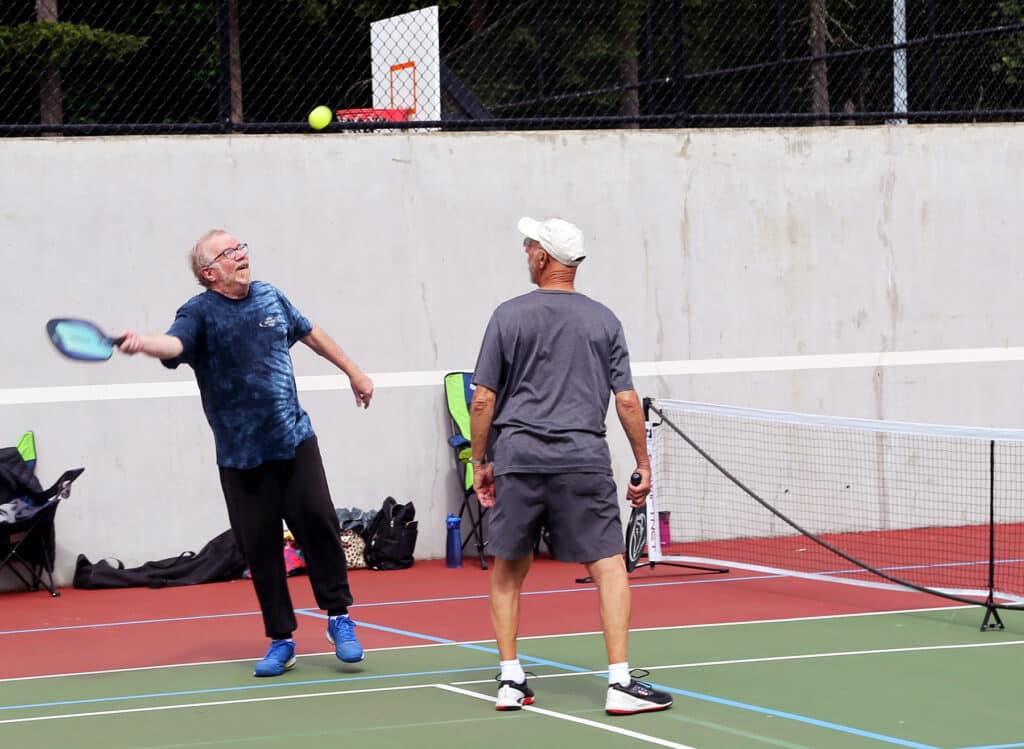
Many, but not all, pickleball players have a background in tennis. Vince Dice
But there’s no doubt that pickleball — a mashup of tennis and ping-pong with a bit of badminton thrown in — is riding a wave of popularity. The wave will roll into Gig Harbor and neighboring communities in the next year or two if current plans come to fruition.
Pickleball popularity
The game invented by Bainbridge dads to entertain their kids now has professional players, two rival national associations, leagues, tournaments, voluble and assertive lobbyists, Olympic dreams, and celebrity fans. Among the latter, according to media reports: Stephen Colbert, Ellen DeGeneres and Jamie Foxx.
According to data compiled by the Sports and Fitness Industry Association, a Maryland-based national trade group, 4.8 million people play pickleball nationwide. In just the last two years, the number of players increased by nearly 40 percent. That makes it the nation’s fastest-growing sport for the second year in a row by the SFIA’s reckoning. Pickleball is also growing internationally.
Why the surge in popularity in a sport that’s been around for 57 years but was almost unnoticed outside its Western Washington birthplace for most of that time?
Pickleball enthusiasts cite a variety of reasons why new players — from lithe, lightning-quick young pros to comfortably rounded retired couch potatoes — are flocking to their favorite sport.
Like tennis, but also not like tennis
Gig Harbor resident Anne Smith used to play a good game of tennis. “As I got older, I found I couldn’t do the running that tennis requires. A pickleball court is about one-third the size of a tennis court.’’
Adding to pickleball’s appeal, Smith says, “It’s very easy to learn.’’ Moreover, pickleballers hit underhanded, so the ball, while it can zip along when good players have at it, moves more slowly than a tennis ball, making it easier to reach and address.
Smith, who learned to play pickleball when she lived in Oregon, plays locally in Sehmel Homestead Park. When it rains and the wind whips into gusts, she ducks indoors and plays at Gig Harbor’s Tom Taylor Family YMCA, where she’s a member. “It has a full-size gym with a wood floor, and a smaller second gym.’’ Add in the second gym, and the Y offers five courts all told.
Pickleball, Smith explains, “has a completely different culture than tennis.’’ Among other things, in tennis, it’s common to see two players go one on one. In pickleball, doubles are much more common. With four players each on the Y’s five courts, 20 people can play at the same time.
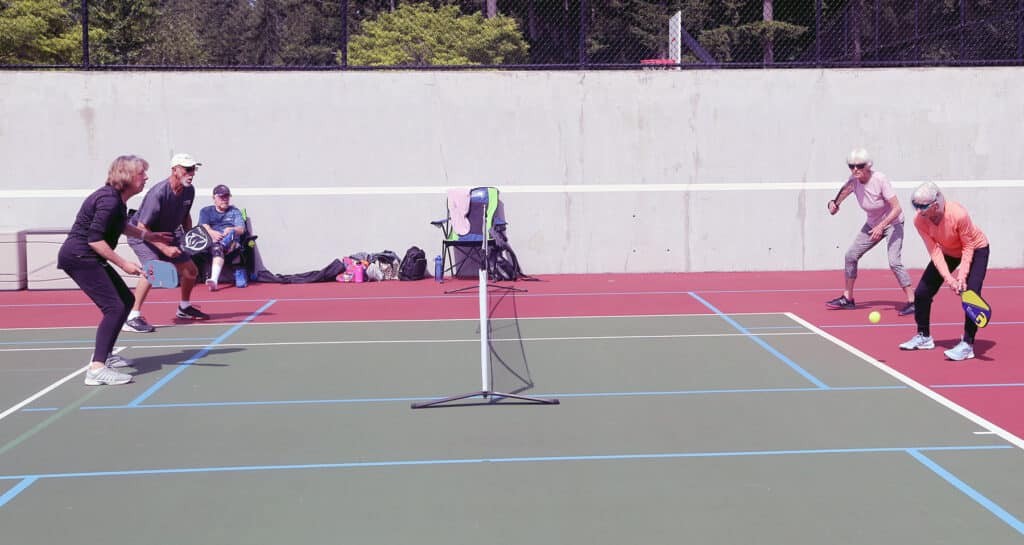
Pickleball is played on a smaller court, allowing more players to participate than in more space-consuming sports like tennis. Vince Dice
“It’s unusual to see more than two or three people on a tennis court,’’ Smith observes. “In pickleball, you get more bang for your real-estate buck.’’ That makes pickleball appealing to builders and operators of recreational facilities, too.
Sharing court space
Husband and wife Oscar Roberto and Tamara Davidson, also of Gig Harbor, picked up pickleball when they lived in North Carolina. Neighbors moved there from Florida, where pickleball, like the weather, is hot. Warm-to-sizzling Texas and Arizona are also hotbeds of pickleball, something of an irony for a sport from the cool, rainy Pacific Northwest.
“You need your reflexes for pickleball, but it’s not as hard on the legs as tennis,’’ says Roberto, who plays both pickleball and tennis. He enjoys both sports but adds, “I’d much rather play tennis.’’
The couple play sports, kick back and socialize at Gig Harbor’s Canterwood Golf and Country Club, where they are members. Sometimes all these activities fuse into one. “Every two or three months, there’s a big party on the courts,’’ Roberto says approvingly.
Ross Eaton, director of racquetball sports and the club’s tennis pro, attests to pickleball’s popularity. There are eight tennis courts at Canterwood, Eaton says. Four of them are shared with pickleball, with two pickleball courts on each of four designated tennis courts. “We have blended lines’’ to mark the different dimensions of each sport, ‘’with soft blue lines for pickleball.’’
“Our tennis players are used to pickleball,’’ Eaton attests. In fact, “many of our members play both sports.’’ Non-members can play at Canterwood, too, he notes, with guest passes.
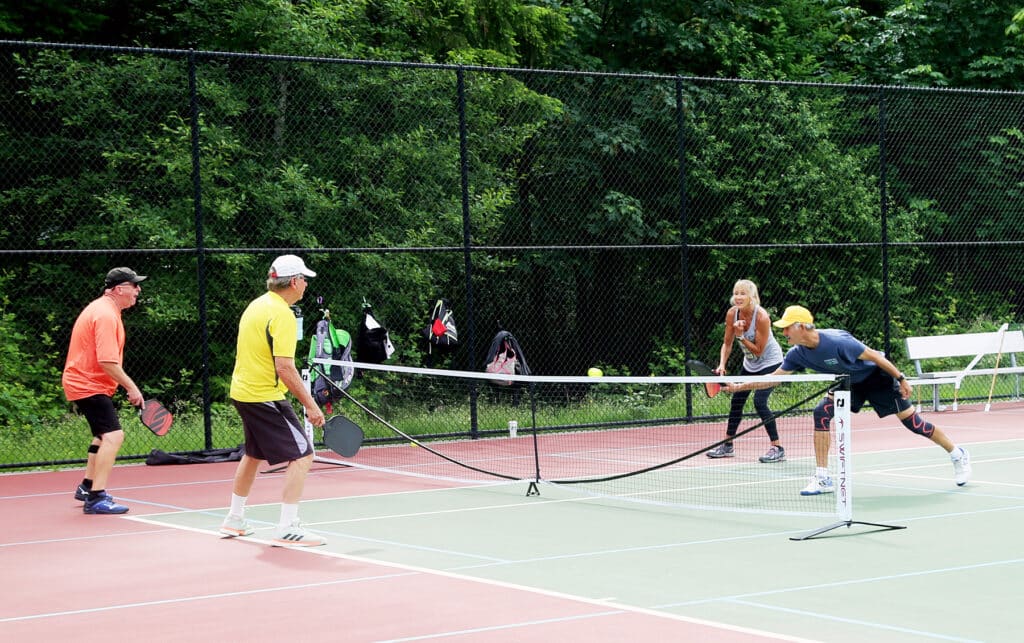
Pickleball players get in a game on June 21, 2021, at Sehmel Homestead Park. Vince Dice
A social sport
When pickleball picked up in popularity in recent years, Eaton earned two certifications to teach the game, in addition to his long-standing certification to teach tennis. Eaton oversees three pickleball leagues at the club, where members play year-round.
In January 2019, the club began covering tennis and pickleball courts from October until April with a 120 foot by 240 foot ‘bubble’. “It’s made of material that’s a little thicker than vinyl and weighs 18,000 pounds,’’ Eaton says.
Regardless of whether it’s played indoors or outdoors, Roberto and Davidson agree that pickleball is an intensely social game. That’s one big reason they like it. ‘’The court is so small, so you’re always talking to people,’’ Davidson says.
The sport has historically appealed to people over 60, who may be living with bum knees, sore shoulders or painful hips. Yet middle-aged people play pickleball, too. And then there are ambitious pros in their 20s with visions of big bucks should the game reach the next level.
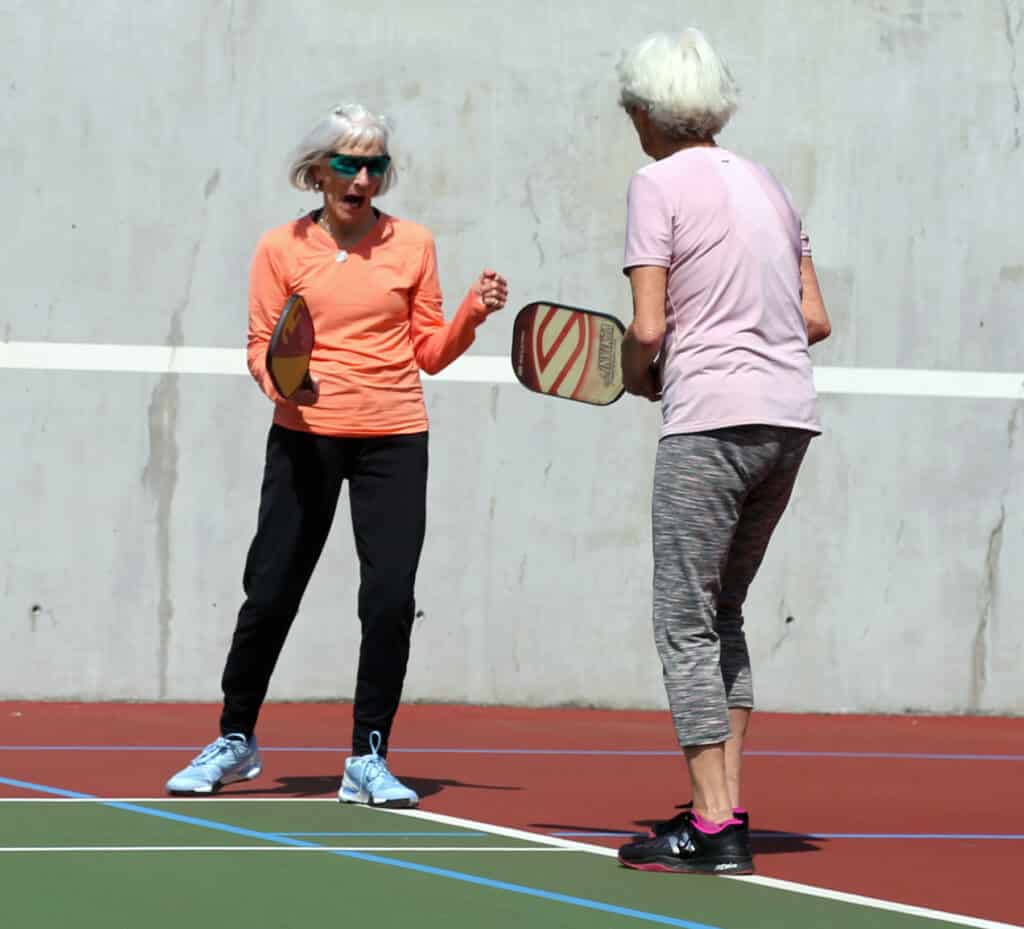
Players celebrate after winning a point at Sehmel Homestead Park recently. Vince Dice
Pickleball and the Sports Complex
Local planning officials have noticed pickleball’s broadening appeal and are responding accordingly. Both the city of Gig Harbor and the Peninsula Metropolitan Parks system, which already has 14 pickleball courts, are planning to build more public courts to accommodate the surging number of players.
Presently, Gig Harbor proper has one public outdoor pickleball court — shared with a tennis court — a rather forlorn-looking spot in Crescent Creek Park. When a journalist visited, twice, in recent weeks, no one was playing either pickleball or tennis in the park.
Gig Harbor plans to install six outdoor pickleball-only courts in the city’s proposed sports complex. If built as planned, the complex will cover 30 acres and feature mixed use facilities for a range of sports.
Pickleball is a small part of the plan. But players look forward to having their own courts to complement existing courts in and near Gig Harbor. The new courts would be built as part of Phase 1B of the complex.
Anne Smith says: “Just (north) of the YMCA, they’d have to take down a bunch of trees.’’ But pivoting to presumed benefits for local restaurants, hotels and other businesses, she adds “I definitely support it.’’
Just across the city line, Denis Ryan, director of parks services for Pen Met Parks, says Shemel Homestead Park has 12 existing outdoor courts. Eight of them are shared with tennis courts and four shared with basketball courts. Hales Pass Parks has two outdoor pickleball courts shared with basketball courts.
PenMet’s plans
Shared courts typically have stripes for pickleball with bright orange or yellow chalk or tape. To a non-player or a novice, the proliferation of lines and colors give the courts a cluttered, busy look.
Striping is necessary due to big differences in court sizes. Pickleball courts are 44 feet long and 20 feet wide. Standard-size tennis courts are 78 feet long and 27 feet wide and have classic white lines to guide and contain play.
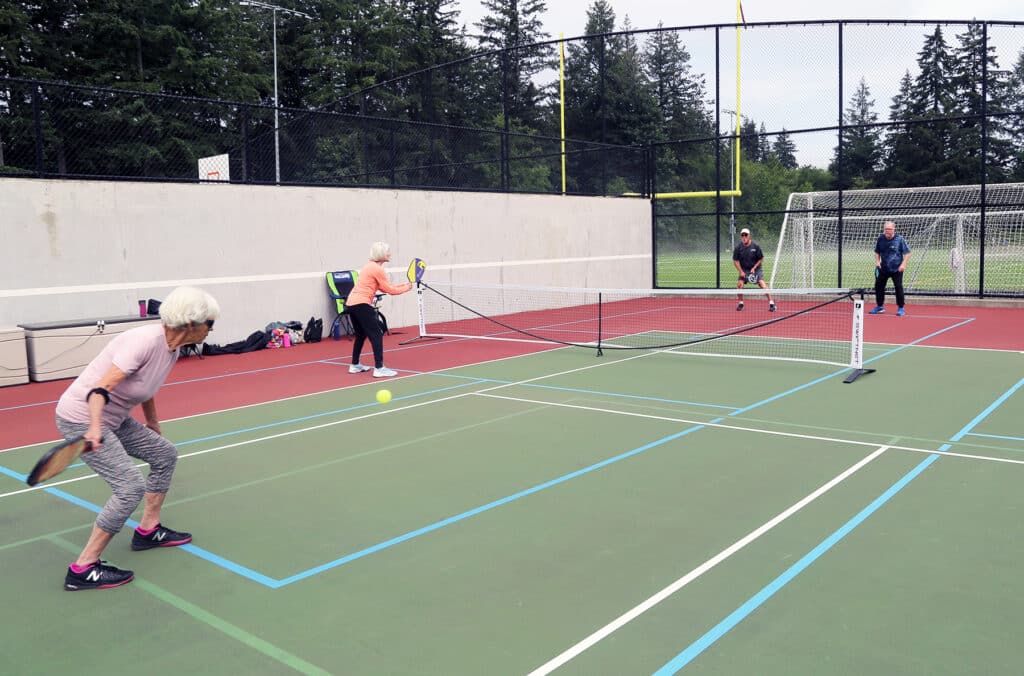
A player serves during a game at Sehmel Homestead Park. Vince Dice
Ryan says Pen Met plans to build both outdoor and indoor sports facilities.
“As part of the new community recreation center the indoor fieldhouse will be configured for multipurpose athletic events, including striped pickleball courts,’’ Ryan writes in an email. “We are also planning on striping courts at the Rosedale Hall property behind the existing building.’’
“Recognizing this as one of the fast-growing sports, we often hear the request to look for opportunities to increase playable areas,’’ he says. “We anticipate much public input and support for increased pickleball access as we start to develop our upcoming Parks, Recreation and Open Space Plan (PROS Plan) later this year.’’
Pickleball pushback
Despite its rapid rise in popularity — actually, in large part because of it — pickleball has encountered pushback.
Some of it comes from tennis players who resent sharing courts with upstart pickleballers. Some of it comes from neighbors who bristle at the noise that shouting clusters of pickleball enthusiasts make. The loud whack of paddles on pickelball’s hard plastic ball compounds the problem.
Oscar Roberto, the Canterwood club member who plays both tennis and pickleball, allows that there can be friction between the two groups. When that happens, he asks for a polite conversation between pickleballers and tennis players, and together they work it out.
Because this is celebrity-besotted America, stars occasionally jump into the tennis and pickleball kerfuffle. After playing tennis next to a group of boisterous pickleballers in Southern California last month, tennis legend Martina Navratilova tweeted: “I say if pickleball is that popular, let them build their own courts.’’
I say if pickleball is that popular let them build their own courts:) https://t.co/WA1BBQaoWw
— Martina Navratilova (@Martina) May 10, 2022
Players and fans acknowledge that pickleball is a noisy game. It’s common, Anne Smith says, for players “to hoot and holler. They’re having a good time and laughing.’’
That said, Smith, a lifetime member of the USA Pickleball Association, allows, “I would not want to live right next to a pickleball court.’’ Some people want to muffle the noise from games by putting up sound walls. But Smith doesn’t think walls will work. Better to build courts a good distance from people’s homes, she suggests.
Official state sport
Bumps in the road notwithstanding, pickleball’s popularity continues to accelerate. In March, Gov. Jay Inslee journeyed to the sport’s holy of holies, the Bainbridge Island backyard where the game was invented. Inslee, himself a Bainbridge Islander, signed a bill designating pickleball as Washington’s official state sport.
Tongue firmly in cheek, Inslee proclaimed: “We hold these truths to be self-evident. That all are created equal. That they are endowed by their creator with certain inalienable rights. Amongst those things being the right to life, liberty and the pursuit of pickleball.’’
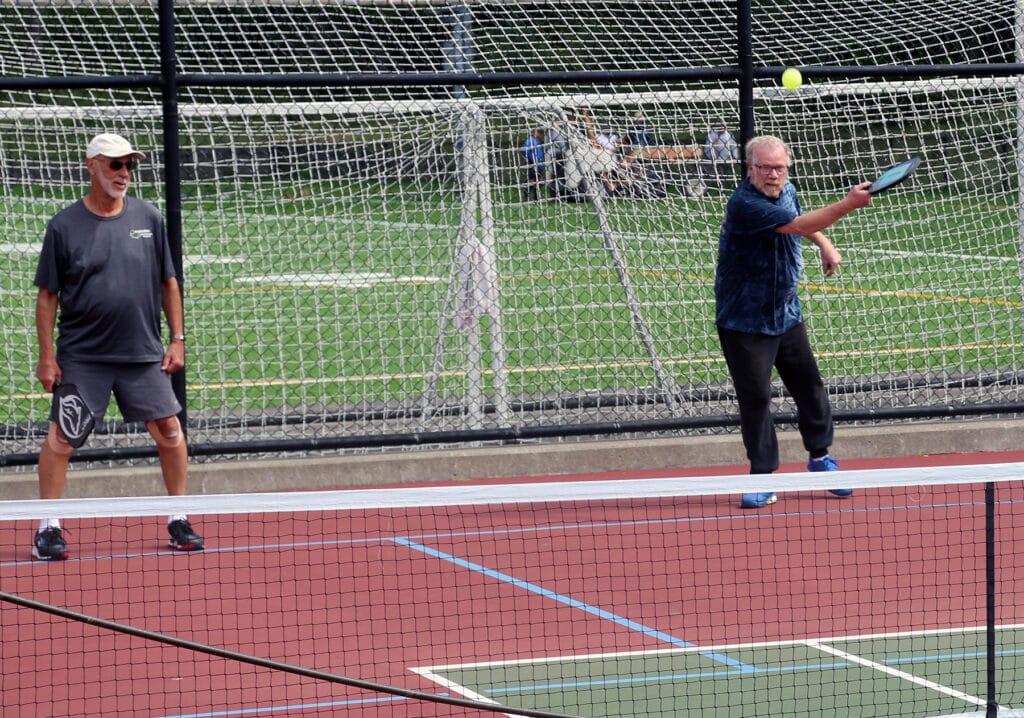
The fastest-growing sport in the country blends elements of tennis, badminton and other racquet sports. Vince Dice
